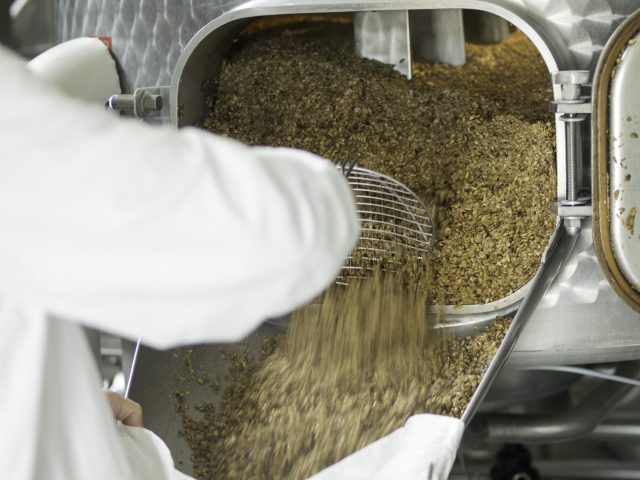This website uses cookies so that we can provide you with the best user experience possible. Cookie information is stored in your browser and performs functions such as recognising you when you return to our website and helping our team to understand which sections of the website you find most interesting and useful.
New method created to reduce waste when brewing beer
A new technique used to extract more than 80% of the protein from grain leftovers when making beer has been created by scientists to reduce brewing waste.

The method, brought to being by researchers from Nanyang Technological University in Singapore (NTU Singapore), was recently published in the Innovative Food Science and Emerging Technologies journal, means that millions of tons of grain wastage can now also be used to enrich human diets.
Historically, the residue leftover from malted barley after brewing beer, often referred to as spent grain, is a byproduct that makes up 85% of the total waste during the process. Currently, worldwide, approximately 36.4 million tons of spent grain is produced every year, but now the new techniques will change this and make beer more sustainable and ecological.
Until now, spent grain is usually discarded after beer has been brewed with some sustainable breweries making sure it is used for animal feed, biofuel production, or composting. However, according to science reports, depsite this, a high proportion of spent grain still ends up in landfills, generating greenhouse gases such as methane and carbon dioxide.
After exploring new use cases for the grain proteins, the scientists revealed that if using their protein extraction method the extracted proteins could be incorporated in foods, offering the potential to significantly enhance its nutritional value and assist in helping people meet their daily protein goals.
The extracted proteins could also allegedly be used for cosmetic purposes and follow the trend for consumers looking for more eco-friendly goods, with reports citing that 66% of global consumers are expressing a readiness to pay premium prices for products from sustainable brands.
Looking at the protein extraction findings, researchers said that they extracted up to 200 grams of protein from one kilogram of brewers’ spent grain, indicating its potential as a protein source. The Singapore Health Promotion Board also highlighted that it recommends that the average adult woman should aim to consume approximately 40 grams of protein daily, while an average adult male requires around 56 grams daily.
According to the findings, brewers’ spent grain proteins are safe for human consumption and of high quality, making them suitable for direct use in supplements as well as boosting the protein content of plant-based foods. Both of these developments means that the extraction method can not just change the beer sector for the better, but also offer a tangible way for vegans and vegetarians to enhance their diet’s nutritional value.
The researchers also said that the extraction method would also help mitigate a possible protein shortage due to a forecast 73% increase in meat consumption by the year 2050 which has been predicted by the Food and Agriculture Organisation of the UN to occur amidst the future rapid growth of the global population.
The NTU researchers also revealed that the proteins extracted from the brewers’ spent grains were found to be rich in antioxidants, which could not only protect human skin from pollutants but could also potentially extend the shelf life of cosmetics and skincare products.
The move has been identified as a way to present an eco-friendly alternative to cosmetic components such as parabens, which disrupt hormone function in sea life as well as put paid to petroleum-based ingredients which have been rumoured to contribute to environmental pollution.
Speaking about the method, senior author Professor William Chen, director of NTU’s Food Science and Technology (FST) said: “Our study, which presents more sustainable and efficient ways to add value to brewers’ spent grain disposal, is a crucial step towards mitigating its contribution to greenhouse emissions and reducing environmental strain, while also enriching the global food supply chain.”
Chen explained: “Demonstrating that the protein-rich qualities of brewers’ spent grain could be successfully extracted and funnelled into supplements and enriching plant-based proteins to make them more attractive to the consumer addresses two global pressure points—food wastage and food shortage.”
Also contributing to the study, Dr. Chai Kong Fei, senior research fellow at NTU’s FST, said: “The protein extracted from brewers’ spent grain from the NTU-developed method has been shown to not only have potential to be included in our diets, but they could also serve in another industry—cosmetics.
Fei observed: “Due to their natural exfoliating properties and abundance of antioxidants, we feel they could be incorporated into various skincare formulations, from moisturisers to body lotions, offering an alternative to chemicals such as preservatives, which have been shown to cause damage to wildlife and the environment after being washed down our sinks.”
The Good Food Institute Asia Pacific managing director Mirte Gosker added: “Innovative applications of underutilised grains like those being brewed up at NTU have the potential to reduce Singapore’s dependence on raw-material imports, provide an additional revenue source for local producers, and help entrepreneurs craft more nutrient-dense plant-based meats. Amid rising food demand pressures, protein extraction from agricultural side streams is field primed and ready to be tapped.”

